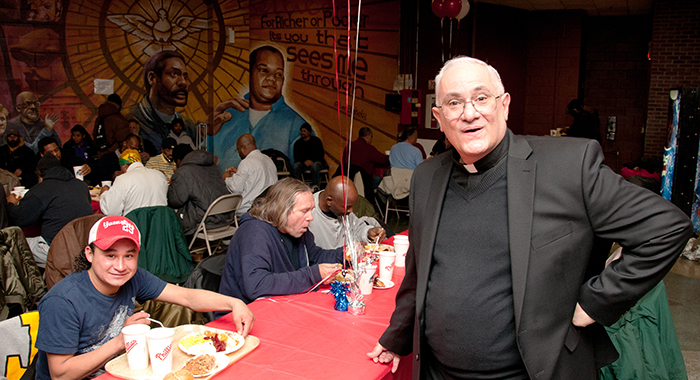Norbertine Ministries and Catholic Social Teaching
It began three floors above the Ugly Pub Tavern.
There, in 1979, Daylesford Abbey’s Father Dominic Rossi and his prayer group took over the operation of a shelter for homeless women in Philadelphia that eventually grew into The Bethesda Project, a non-profit with more than a dozen shelters that provides support, food, and housing to that city’s chronically homeless.
Now, more than 40 years later, Bethesda Project serves 1,400 homeless people each year at 14 sites throughout Philadelphia, helping to address a glaring need. According to the U.S. Department of Housing & Urban Development, Philadelphia in 2020 had 4,676 sheltered homeless and 958 unsheltered for a total of 5,634. By comparison, Chicago had a total of 5,390, Houston 3,974, and Los Angeles 41,290.
One in every five homeless men in Philadelphia has been served by the Bethesda Project. Bethesda is just one of the ways Norbertines minister to the needs of the regions in which their communities are placed. Norbertine outreach honors the original charisms of the order as well as the Gospel-based tenets of Catholic social teaching. As the Center for Norbertine Studies, in collaboration with Norbertines around the world, celebrates 900 years of the order with a series of events in various corners of the globe, Catholic social teaching continues to deeply inform the order’s outreach.
The tenets of Catholic social teaching – life and dignity of the human person; call to family, community and participation; rights and responsibilities; options for the poor and vulnerable; the dignity of work and the rights of workers; solidarity; and care for God’s creation – are the building blocks of “a rich treasure of wisdom about building a just society and living lives of holiness amidst the challenges of modern society,” according to the United States Conference of Catholic Bishops.
The men at Daylesford Abbey are engaged in a range of ministries, including parish ministry, social outreach, education, and spiritual direction. The Spirituality Center hosts not only the Bethesda Project but also personal and group retreats. Daylesford Abbey also is known for Abbey Fest, a popular Catholic and Christian music festival.
Family with those who have none
The Bethesda Project, which remains committed to its calling to find and care for the abandoned poor and, in Rossi’s words, “to be family with those who have none,” operates a continuum of care throughout Center City Philadelphia using a housing-first approach. The approach minimizes barriers to access and allows each individual to take their own journey of healing at their own pace. Rooted in the six values of social work, Bethesda Project seeks to meet the needs of individuals where they are and in what they need. As an Equal Housing Opportunity provider, Bethesda Project does not discriminate on the basis of race, color, religion, national origin, sex, familial status, and/or disability.
Bethesda also offers individualized case management, says Derek Elkins of St Norbert College's Emmaus Center. Elkins is co-director of the college's TRIPS program, which for years has sent a group of students to work in the Bethesda Project in January.
The overall goal of Bethesda Project's case-management services is to assist its guests and residents in becoming more stably housed and to increase their overall independence. Each guest and resident completes an Individualized Care Plan with their own case manager, which allows them to identify goals they wish to achieve. With the Care Plan in place, case managers and engagement specialists connect guests and residents to services in the community that assist in achieving their goals.
An opportunity for transformational encounters
St. Norbert College has been sending students to serve at a Bethesda shelter since 2006 through the leadership of the late Father Sal Cuccia. Cuccia had spent 20 years teaching at Archmere Academy, the Norbertine high school in Claymont, Del., and had personal knowledge of the project. Elkins and colleagues at the Wisconsin college have ensured that the program continues.
“The time at Daylesford has been so impactful for students,” Elkins says, “because of the connections they form with Abbot Dominic Rossi and Father Andrew Ciferni. Both play very significant roles in the order, at St. Norbert College, and with Bethesda Project. They spend significant time with students helping them understand the ways that Catholic Social Teaching calls people of faith to live in solidarity with the poor and rejected.”
One student was so moved by his experience with the Norbertines and at Our Brother's Place, Elkins says, that he worked with the Norbertine abbey in Green Bay to start a local service trip for St. Norbert students to continue the important work of joining faith and solidarity. That student graduated this year and is beginning graduate school to continue equipping students through a career in higher education.
July 31, 2021












